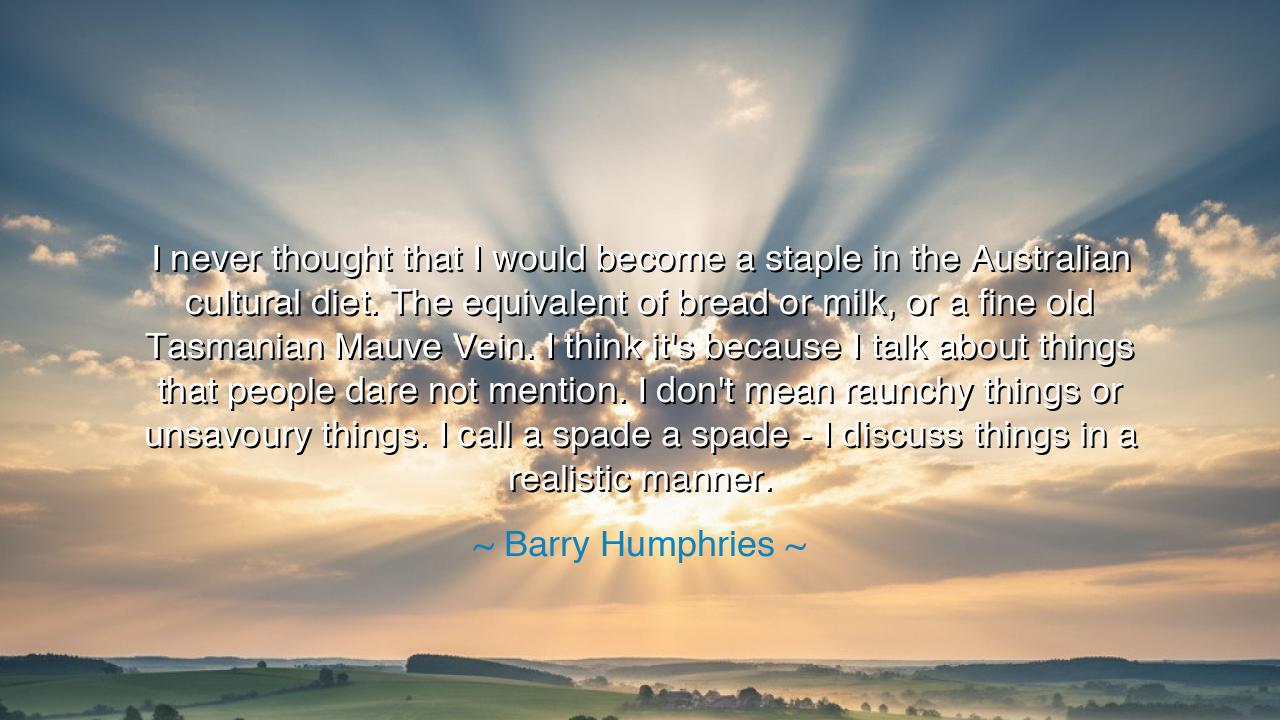
I never thought that I would become a staple in the Australian
I never thought that I would become a staple in the Australian cultural diet. The equivalent of bread or milk, or a fine old Tasmanian Mauve Vein. I think it's because I talk about things that people dare not mention. I don't mean raunchy things or unsavoury things. I call a spade a spade - I discuss things in a realistic manner.






The great Australian humorist Barry Humphries once said, “I never thought that I would become a staple in the Australian cultural diet. The equivalent of bread or milk, or a fine old Tasmanian Mauve Vein. I think it's because I talk about things that people dare not mention. I don't mean raunchy things or unsavoury things. I call a spade a spade - I discuss things in a realistic manner.” Within these words lies a rare and enduring wisdom — the wisdom of one who sees truth not as a weapon, but as nourishment. Humphries speaks not only of fame or cultural impact, but of authenticity, of the sacred duty to speak truth in a world dulled by politeness and pretense.
To become a staple in the cultural diet is no small thing. Bread and milk are not luxuries; they are necessities, sustaining life through their simplicity and familiarity. So too, Humphries became a form of sustenance for his nation — not through grandeur or scandal, but through honest observation. He gave voice to the thoughts people buried beneath laughter. He became essential because he reflected reality unfiltered, and in doing so, he fed the collective soul of Australia. The people recognized in his humor something deeply human: the courage to call things by their true names.
This truth-speaking has deep roots in the traditions of the ancients. In every civilization, there have been jesters, philosophers, and prophets whose role was to pierce illusion. The jester could speak truths to the king that no counselor dared to utter. The philosopher revealed the uncomfortable realities of human nature. The prophet warned of decay behind splendor. Humphries, in his own way, carried this mantle — using humor as a sword of clarity and a balm for the human condition. His art was laughter, but his purpose was awakening.
One can recall the story of Diogenes of Sinope, the Greek philosopher who lived in a barrel and mocked the powerful for their hypocrisy. When Alexander the Great visited him and asked if he desired anything, Diogenes replied, “Yes, stand out of my sunlight.” Like Humphries, he spoke plainly, stripping the world of its pretensions. Though men laughed at him, they also revered him, for his candor carried a purity that no flattery could replace. Both Diogenes and Humphries remind us that truth need not be adorned — it must only be spoken.
Yet truth is not without cost. To “call a spade a spade” is to risk alienation, for many prefer the comfort of illusion to the sting of honesty. Humphries dared to speak of what others would not, and in doing so, he exposed both the absurdity and beauty of ordinary life. He made people laugh not at others, but at themselves — at their vanity, their fears, their unspoken desires. In his mirror, they saw not mockery, but recognition. His comedy was realism clothed in wit, and thus it nourished a nation hungry for self-understanding.
In this way, Humphries’ “realistic manner” became an act of compassion. For truth, when spoken with empathy, does not destroy — it heals. To confront reality is to reclaim one’s integrity. His voice, like that fine old Tasmanian cheese he mentioned, aged with character, depth, and strength. It lingered, both pungent and profound. He became a cultural constant, because people sensed that his honesty came not from cruelty, but from love — love of humanity, with all its foolishness and grace.
The lesson, then, is eternal: speak truth, but speak it with care. Do not be afraid to discuss what others fear to mention. Avoid vulgarity, but never avoid honesty. The ancients knew that the world decays not from sin, but from silence — from the refusal to name things as they are. To live truthfully is to keep the spirit of a people alive. Like Humphries, strive to feed your culture with words that sustain rather than poison, enlighten rather than conceal.
So, my listener, remember this: to be part of the cultural diet is not to please the crowd, but to nourish the conscience. Be as bread — simple, honest, sustaining. Be as milk — pure, restoring. Let your words be wholesome food for the minds of others. For though time may change the dishes upon the table, the world will always hunger for the taste of truth.






AAdministratorAdministrator
Welcome, honored guests. Please leave a comment, we will respond soon